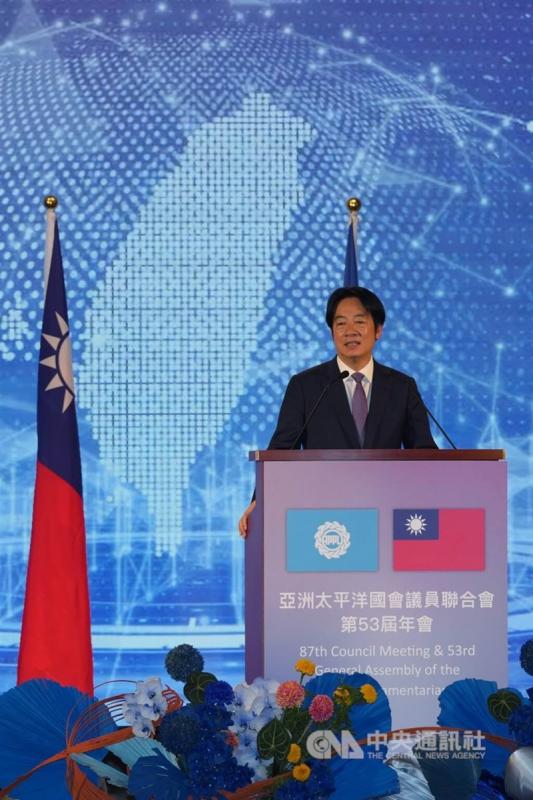President William Lai (賴清德) said today that Taiwan is to work with Asia-Pacific partners to promote peace and sustainable development, while pledging stronger defense capabilities and economic security.
At this year's General Assembly of the Asian-Pacific Parliamentarians' Union (APPU) in Taipei, Lai said Taiwan would "demonstrate its determination to safeguard regional peace," stressing that peace and stability across the Taiwan Strait are "indispensable to security and prosperity in the Indo-Pacific."
Lai said defense spending is to exceed 3 percent of GDP next year under a Cabinet proposal pending legislative approval, and the government aims to raise the figure to 5 percent by 2030.

Photo: CNA
At the same time, Taiwan is boosting economic cooperation with the US, Japan and the EU, reversing its past reliance on China, he said.
Taiwan's investment in China accounted for 7.5 percent of total outbound investment in last year, down from 83.8 percent in 2010, Lai said.
He said Taiwan would also strengthen exchanges with allies and like-minded partners through APPU and other platforms, while remaining open to engagement with Beijing on equal terms.
The assembly included Taiwanese lawmakers from across party lines and parliamentarians from Japan, Guam, the Marshall Islands, Palau, Tuvalu and the Northern Mariana Islands.
Founded in 1965 as the Asian Parliamentarians' Union by former Japanese prime minister Nobusuke Kishi, the group later expanded to promote cooperation across the Asia-Pacific.
Legislative Speaker Han Kuo-yu (韓國瑜) described APPU as "an important bridge" for inter-parliamentary exchange and said Taiwan looked forward to building closer, mutually beneficial partnerships with member states.
Han also urged parliamentarians to continue supporting Taiwan's participation in international organizations and events, saying its inclusion would strengthen global capacity to address climate change, health crises and economic volatility.

The Coast Guard Administration (CGA) yesterday said it had deployed patrol vessels to expel a China Coast Guard ship and a Chinese fishing boat near Pratas Island (Dongsha Island, 東沙群島) in the South China Sea. The China Coast Guard vessel was 28 nautical miles (52km) northeast of Pratas at 6:15am on Thursday, approaching the island’s restricted waters, which extend 24 nautical miles from its shoreline, the CGA’s Dongsha-Nansha Branch said in a statement. The Tainan, a 2,000-tonne cutter, was deployed by the CGA to shadow the Chinese ship, which left the area at 2:39pm on Friday, the statement said. At 6:31pm on Friday,

The Chinese People’s Liberation Army Navy’s (PLAN) third aircraft carrier, the Fujian, would pose a steep challenge to Taiwan’s ability to defend itself against a full-scale invasion, a defense expert said yesterday. Institute of National Defense and Security Research analyst Chieh Chung (揭仲) made the comment hours after the PLAN confirmed the carrier recently passed through the Taiwan Strait to conduct “scientific research tests and training missions” in the South China Sea. China has two carriers in operation — the Liaoning and the Shandong — with the Fujian undergoing sea trials. Although the PLAN needs time to train the Fujian’s air wing and

Taiwanese celebrities Hank Chen (陳漢典) and Lulu Huang (黃路梓茵) announced yesterday that they are planning to marry. Huang announced and posted photos of their engagement to her social media pages yesterday morning, joking that the pair were not just doing marketing for a new show, but “really getting married.” “We’ve decided to spend all of our future happy and hilarious moments together,” she wrote. The announcement, which was later confirmed by the talent agency they share, appeared to come as a surprise even to those around them, with veteran TV host Jacky Wu (吳宗憲) saying he was “totally taken aback” by the news. Huang,

The American Institute in Taiwan (AIT) put Taiwan in danger, Ma Ying-jeou Foundation director Hsiao Hsu-tsen (蕭旭岑) said yesterday, hours after the de facto US embassy said that Beijing had misinterpreted World War II-era documents to isolate Taiwan. The AIT’s comments harmed the Republic of China’s (ROC) national interests and contradicted a part of the “six assurances” stipulating that the US would not change its official position on Taiwan’s sovereignty, Hsiao said. The “six assurances,” which were given by then-US president Ronald Reagan to Taiwan in 1982, say that Washington would not set a date for ending arm sales to Taiwan, consult